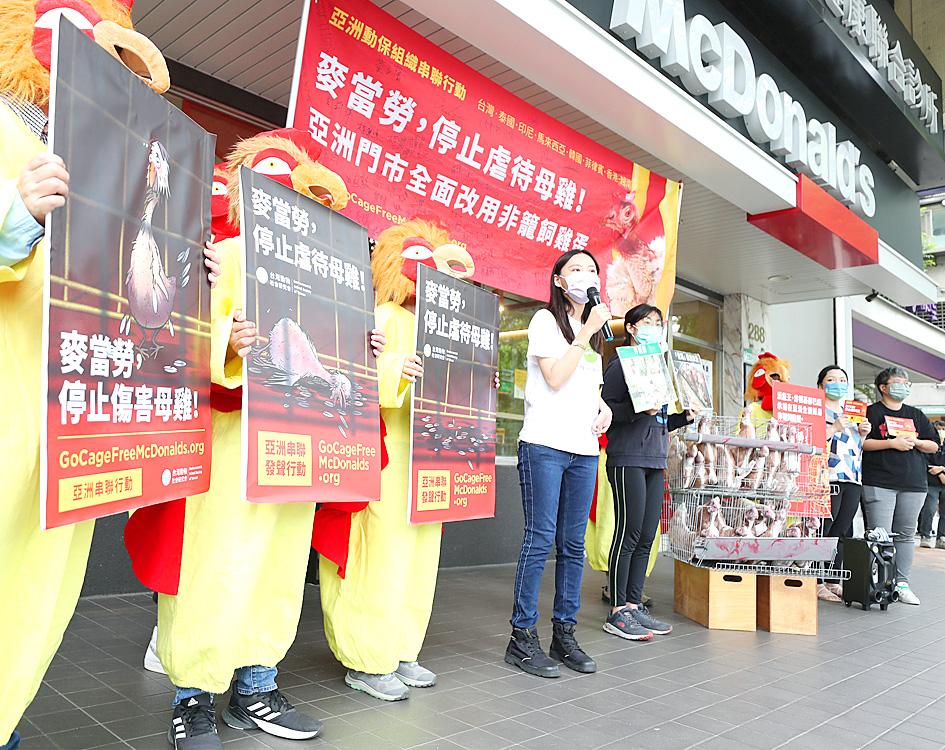A Taiwanese nonprofit group advocating for environmental and animal rights demonstrated in Taipei yesterday to urge fast-food giant McDonald’s to stop using eggs from battery-farmed chickens.
Representatives from the Environment and Animal Society of Taiwan (EAST) dressed in chicken costumes and unfurled banners, holding placards in front of a McDonald’s outlet and calling on the fast-food chain to cease buying battery-farmed eggs and help stop the abuse of egg-laying hens.
The signs read: “McDonald’s, stop abusing hens,” with an EAST representative holding a cage with several mock chickens inside.

Photo: CNA
EAST’s campaign coincided with similar protests in South Korea, Thailand, Indonesia, Vietnam, the Philippines, Malaysia and Hong Kong during a regional “go cage-free” day.
Battery-farmed chickens are raised with two to five hens per cage, with living space about the size of a sheet of A4 paper, EAST researcher Tsun Fang-chu (寸舫筑) told reporters.
The system is arranged in rows and columns of cages connected as a unit, and has long been criticized as inhumane.
Other chain restaurants such as KFC and Burger King have cage-free egg policies in place, Tsun said, adding that McDonald’s continues to use eggs from battery-farmed chickens throughout Asia, despite having promised to use free-range eggs in other markets such as the US, Canada, Latin America and South Africa.
Animal rights groups in Asia have been lobbying McDonald’s to stop using such eggs for 10 years, but the US-based chain has not provided a satisfactory response, Tsun said.
Despite McDonald’s telling its shareholders this year that it would take advantage of its global influence to improve animal welfare, there was no immediate sign that the chain is stopping the practice in Asia, Tsun said.
“It is almost discriminatory, and certainly a regrettable move from McDonald’s,” she said.
McDonald’s Taiwan said in a statement that the company follows food sanitation regulations in Taiwan and has paid close attention to animal rights, having improved the environment chickens are raised in through the use of water-curtain systems and ensuring the animals are supplied with ample nutrition.

A preclearance service to facilitate entry for people traveling to select airports in Japan would be available from Thursday next week to Feb. 25 at Taiwan Taoyuan International Airport, Taoyuan International Airport Corp (TIAC) said on Tuesday. The service was first made available to Taiwanese travelers throughout the winter vacation of 2024 and during the Lunar New Year holiday. In addition to flights to the Japanese cities of Hakodate, Asahikawa, Akita, Sendai, Niigata, Okayama, Takamatsu, Kumamoto and Kagoshima, the service would be available to travelers to Kobe and Oita. The service can be accessed by passengers of 15 flight routes operated by

GIVE AND TAKE: Blood demand continues to rise each year, while fewer young donors are available due to the nation’s falling birthrate, a doctor said Blood donors can redeem points earned from donations to obtain limited edition Formosan black bear travel mugs, the Kaohsiung Blood Center said yesterday, as it announced a goal of stocking 20,000 units of blood prior to the Lunar New Year. The last month of the lunar year is National Blood Donation Month, when local centers seek to stockpile blood for use during the Lunar New Year holiday. The blood demand in southern Taiwan — including Tainan and Kaohsiung, as well as Chiayi, Pingtung, Penghu and Taitung counties — is about 2,000 units per day, the center said. The donation campaign aims to boost

ENHANCING EFFICIENCY: The apron can accommodate 16 airplanes overnight at Taoyuan airport while work on the third runway continues, the transport minister said A new temporary overnight parking apron at Taiwan Taoyuan International Airport is to start operating on Friday next week to boost operational efficiency while the third runway is being constructed, the Ministry of Transportation and Communications said yesterday. The apron — one of the crucial projects in the construction of the third runway — can accommodate 16 aircraft overnight at the nation’s largest international airport, Minister of Transportation and Communications Chen Shih-kai (陳世凱) told reporters while inspecting the new facility yesterday morning. Aside from providing the airport operator with greater flexibility in aircraft parking during the third runway construction,

American climber Alex Honnold is to attempt a free climb of Taipei 101 today at 9am, with traffic closures around the skyscraper. To accommodate the climb attempt and filming, the Taipei Department of Transportation said traffic controls would be enforced around the Taipei 101 area. If weather conditions delay the climb, the restrictions would be pushed back to tomorrow. Traffic controls would be in place today from 7am to 11am around the Taipei 101 area, the department said. Songzhi Road would be fully closed in both directions between Songlian Road and Xinyi Road Sec 5, it said, adding that bidirectional traffic controls would